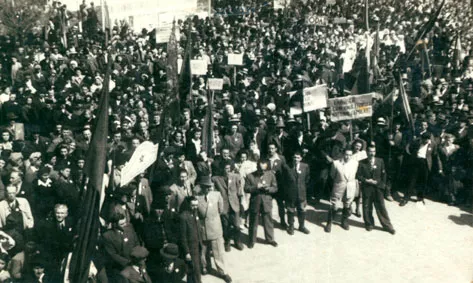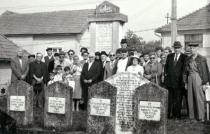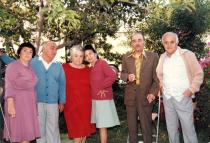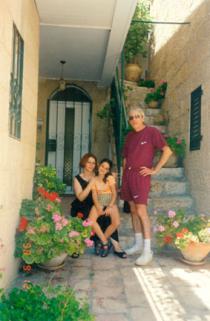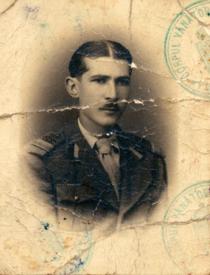Communist procession on the main square in Des
This was a communist procession on the main square in Des, in around 1945, they were big communists. My husband Fulop Grossmann is in the first line, he’s the first from right, in the first line.
After the war my husband inherited the house of his brother-in-law, of Mihaly Katz. We lived there, we had a tailor's workshop too, a very elegant one, and we had a little textile warehouse. My husband was one of the best tailors in Des, and even so we were left with nothing. The communist regime came, we had to close the workshop, and they made my husband deputy mayor, in 1949, but only for a few months. He was a very honest man, he didn't come home, he was at the town hall day and night. And he was the first they kicked out. They said he was Zionist, they expelled him from the party too. He was member to the labor Zionist organization, the Hashomer Hatzair. There were several Zionist organizations, right-wing, left-wing, this was a left-wing Zionist organization, a workers' organization. But it [his membership] didn't last too long, the whole story lasted a few months, in 1946 or 1947. Then [after nationalization] he restarted his profession, we kept on working as tailors in the cooperative. When the cooperative was established, everybody had to close their workshop. We had two sewing machines, we handed in one of them. We had to do so, well, that's how they could establish the cooperative. Everybody brought what they had, they brought machines, tables, chairs, all the junks, they brought there everything. First it had a different name, at the beginning it was the craftsmen's cooperative, then it became the Cascom.
I didn't enroll the party. I wasn't either for, either against communism. I was satisfied with the system, which allowed my children to learn, I didn't have to pay for it, they both had a scholarship. We were badly off, I didn't work, my daughter was ill, so I didn't work. We were struggling. We didn't have anything then either. But I wasn't against it, only if they gave us to eat. Why didn't Ceausescu give us to eat? Who would have been angry of Ceausescu if people had something to put on the table, a woman had something to cook? You had to queue up at three at dawn to buy some milk. This was revolting in communism. Otherwise we weren't against it. I never went to shout, when we had to go out from the cooperative [Editor's note: Edit Grossmann refers to the workers' marches organized during communism], I hid and came home to work, I had a household, right? However, if Ceausescu gave people to eat, nothing would have happened against him. After all, let an entire nation starve… Well of course, those who were closer to the meatball didn't starve. And those who were sellers. But anyone else was staying half-a-day with their child in the arm to get half kilogram of sugar, and finally they went home with nothing. One had to queue up for bread, at three in the night the light was turned up everywhere, we had to get up to go down and put in the queue our milk-bottle. Well, such nonsense.
